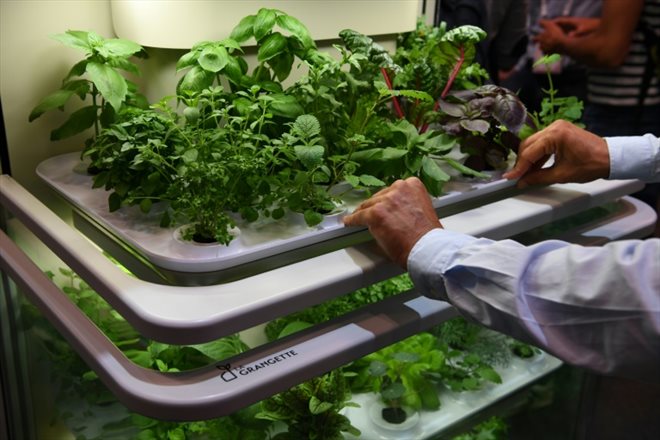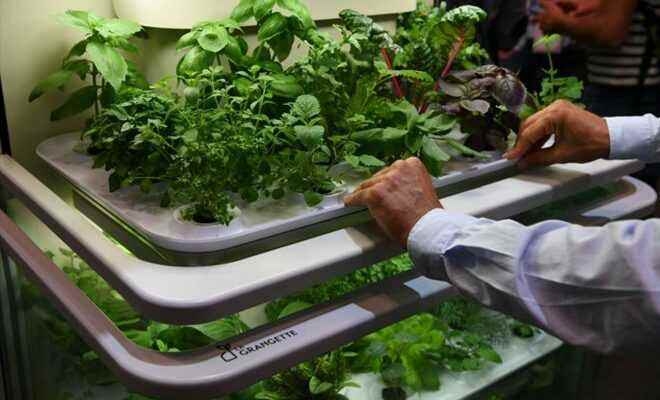An indoor vegetable garden system developed by the start-up “La Grangette” presented at the VivaTech show on June 17, 2022 in Paris (AFP / Eric PIERMONT)
From a corner kitchen to the stretches of sand on the planet Mars, will we soon be growing plants in artificial environments controlled by technology? Some start-ups believe in it, but are still groping to find the economic model that will make them viable on a large scale.
“Within 5 to 10 years, the majority of homes will be equipped with indoor vegetable gardens”, small cupboards where plants grow in a fully controlled environment, said this week at the VivaTech show in Paris Thibaut Pradier, the founder of the start. -up “La Grangette”.
Once the consumer is equipped with a vegetable garden, this company plans to provide them with refills in the form of a coconut fiber capsule, which contains a seed with the desired plant, for a target price of 1.5 euros.
The purchase of the seed then gives access to an application which indicates how to set up the indoor vegetable garden in an appropriate manner – dosage of nutrients, humidity, light… – and makes it possible to follow the growth of the plant.
Proof that the market is buoyant, the household appliance manufacturer LG “already produces indoor vegetable gardens with great success in South Korea and Miele has just launched in Germany in particular”, indicates Mr. Pradier.
For him, this agriculture in a totally controlled environment is indeed part of the equation to succeed in feeding the planet at an acceptable environmental cost.
Certainly “the indoor vegetable garden will consume the equivalent of a fridge” but the carbon footprint of its salad will be much better “because it will not have to be transported and delivered”, he says.
Interstellar Lab founder Barbara Belvisi, who wants to grow plants in the harshest environments, is on the same page.
“Traditional agriculture alone will not be able to feed 9 billion human beings,” she says.
“A closed and controlled environment makes it possible to optimize energy consumption” and can also make it possible to “relocate agriculture” by avoiding importing from distant countries products that cannot be cultivated on site.
Interstellar Lab, which has raised 7 million euros and employs around 30 people, plans to deliver around 20 of its “Biopods” by the end of 2023, 55 square meter cultivation “domes”, where plants grow in a nutrient mist in aeroponics.
These modules, completely impervious to their environment, foreshadow the true ambition of Interstellar Lab on Earth: culture in space – on a space station for example – or on another planet.
– “Continue testing” –
For now, Biopods are intended for pharmaceutical and cosmetic laboratories or any other industry looking for very specific plants with high added value, explains Barbara Belvisi.
“At the beginning, it will not necessarily be for food, except for very specific plants like vanilla”.

An indoor vegetable garden system developed by the start-up “La Grangette” presented at the VivaTech show on June 17, 2022 in Paris (AFP / Eric PIERMONT)
The typical example for her is vetiver, a root used in perfumery which grows very well, and without destroying the soil, in aeroponics.
Because for indoor farming, the road to commercial viability is long, as evidenced by Agricool’s bankruptcy filing.
The promising French start-up, which had raised 35 million euros in 2018, wanted to grow salads or strawberries in urban containers equipped with computers, as close as possible to the consumer.
Despite the enthusiasm for its concept, it has not succeeded in finding a viable economic model, explains its co-founder Guillaume Fourdinier.
“The consumer will agree to pay around 20% more” for this type of local product, “but this is not enough to make R&D costs profitable and it remains above the prices of traditional” competitors, he regrets. he.
Agricool had managed to become profitable on some plants, such as aromatic herbs, but did not succeed on strawberries or lettuce, whose production costs were higher.
His diagnosis agrees with that of Barbara Belvisi: in the short term, this type of culture may only be viable for products with high added value.
But “in the long term, everything will change with climate change” and urban farms, in domes or containers, may prevail if temperatures prevent outdoor cultivation, in southern countries in particular.
“To meet the major challenges that await us on food, we will have to continue to test and invest massively in parallel in the transformation of traditional farms”, he maintains.
© 2022 AFP
Did you like this article ? Share it with your friends with the buttons below.




